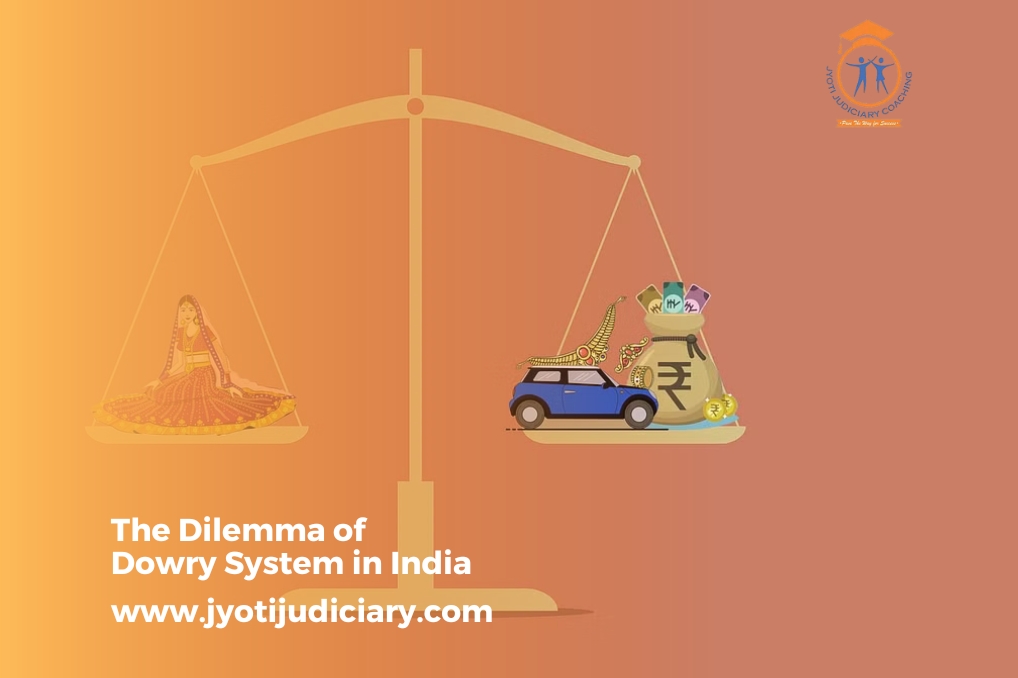
The Dowry System in India has existed for a very long time. The dowry, which may also consist of property, is the amount of money given to the boy or their family upon marriage.
The system of dowries is thousands of years old, centering the Marriage customs and dowry. It was designed to show respect for both families by giving the groom financial support during the union, enabling him to take good care of his bride. Even though they are still utilized in society today, dowries have different meanings over time.
Dowry IPC: Is it Legal or Illegal?
- Both giving and receiving dowries were declared unlawful by the statute.
- Nonetheless, the legal definition of dowry is rather narrow and excludes any gifts provided freely in the absence of requests.
- As a result, dowry demands are now expressed utilizing a whole new vocabulary that does not require words.
Dowry System in India
- As a practice, custom, and tradition, the bride’s family gives away riches, wealth, and property to her spouse and in-laws as a consideration or security for a good marriage, according to the dowry system in India.
- To put it simply, the dowry system in India is the transfer of parental assets, money, and treasures to the groom’s family during the marriage, which is viewed as a security measure and a sign of good faith.
- It originated primarily in the medieval era when the bride was compelled to bring a dowry as a strict precondition and obligation.
Effects of Dowry System
The effects of the dowry system are as follows:
- The widespread belief that women are liabilities is a result of the dowry system. When it comes to things like education, they are typically treated poorly and are subjected to subordination.
- The bride’s family now sees the dowry as more of a financial investment that opens doors for them to connect with powerful individuals and lucrative commercial ventures.
- Women are consequently viewed as commodities. Domestic violence including murders as well as violent acts are the effects of the dowry system.
- Similar to domestic abuse, offenses associated with dowries employ financial, psychological, and physical abuse in addition to harassment as a means of punishing the victim or enforcing compliance.
Women’s Rights and Dowry: Taboo
- Impacting the Career of Women: The larger background for the practice of dowry is the dearth of labouring women and their consequent lack of financial independence. In order to assist them save money for their dowry, the less fortunate members of society send their daughters to work. While the majority of middle-class and upper-class households send their girls to school, employment prospects are not given priority.
- Objectifying Women: The dowry of today is more akin to a monetary commitment made by the bride’s family in order to gain access to influential people and prosperous business opportunities. Women are thus treated like commodities.
Dowry IPC: Prohibition
The Anti-dowry laws in India are as follows:
The Indian Penal Code:
- Criminal law can appropriately address dowry-related issues and also address the violence that is connected to dowries.
- A woman is deemed to have died from “dowry death” under Section 304B of the IPC if she passed away during the first seven years of her marriage from burns, physical harm, or unanticipated circumstances, and it can be demonstrated that her husband or his relatives mistreated or cruelly treated her as a result of the dowry.
- It carries a seven-year to a life sentence in prison as punishment.
The Dowry Prohibition Act:
- Any property or valued security given or agreed to be given in the future, directly or indirectly, in connection with a marriage, is considered a dowry as defined by Section 2 of this act.
- This Act states that soliciting dowry, whether directly or indirectly, will result in a penalty that carries a minimum jail sentence of six months and a maximum sentence of two years, along with a fine of 10,000 rupees.
- As anticipated, this act provides several punitive and preventive measures, although the objectives have not been achieved.
- The government has failed to implement the law because dowries are too deeply embedded in society overall, contributing to the lack of success in addition to a few minor problems.
The Protection of Women from Domestic Violence Act:
- Section 3 of this specific act specifically covers any harassment, abuse, or harm done to a woman to coerce her to comply with an illegal dowry demand.
- The act aims to protect women nationwide from all forms of domestic abuse.
The Indian Evidence Act:
- Section 113B, which requires the court to presume that the person who is shown to have exposed the lady to abuse or harassment shortly before her death is liable for the dowry death, has taken on the burden of proof in cases involving dowry fatalities.
- Under section 304B IPC, it is stipulated that if it can be proven that a woman was subjected to abuse or harassment before her death, it must be because of, or in compliance with, the demand for dowry death.
Dowry Death IPC: How it Can Be Stopped?
The dowry death ipc can be stopped by:
- Under no circumstances accept or offer dowry. Both people who give and receive dowries are subject to fines and jail time under Indian law.
- Give up teaching your daughters that keeping quiet will ensure a successful marriage.
- Keep an eye out for any strange or unexplainable bruises, injuries, or illnesses that a girl may have after marriage. Never disregard any indications of emotional or physical abuse.
- Keep an eye out for any warning signs, particularly if your daughter keeps asking for a sizable sum of money after getting married.
- Rather than viewing your daughter as a burden, assist her in becoming self-assured and independent. Put money into her education rather than her union.
- Raise awareness of the dangers of dowries in your community.
The Dowry death statistics demonstrate how prevalent gender-based violence is. Each representation portrays a terrible death, a lady assaulted in reply to demands for dowry. The statistics highlight the urgency with which society reform, security forces, and extensive networks of support must be implemented to end this terrible crime against women.
Dowry System in India FAQs
Who started the dowry system in India?
In India, the dower was a custom predating British rule. But it was nothing like it is now. The dowry was a pre-colonial institution run by women for women, giving them the means to maintain their independence, establish their position, and provide a safety net in case of emergency.
What is the main reason for dowry?
In some communities, dowries have functioned as a mutual gift from the bride’s relatives to the groom’s relatives, compensating the latter for the costs paid in granting the bride wealth. Instead of being solely commercial, these interactions strengthen the bond and validate the union of the two families.
Is dowry good or evil?
As a result, dowries are now viewed as a curse that brings misery and wickedness. It doesn’t really matter if parents beg, borrow, or steal, a successful marriage requires the daughters’ parents to provide a sizable dowry.
What is the punishment for giving dowry?
According to Section 3 of the Act, providing or receiving a dowry is illegal and is punishable by rigorous laws that carry minimum sentences of five years in jail, a minimum fine of fifteen thousand dollars, or the whole sum of the dowry, whichever is higher.
Is dowry a curse?
Societies have suffered from the curse of dower for far too long. It maintains financial hardship, discrimination, abuse, and exploitation in addition to gender inequality. Legislative actions are necessary, but only collective action, empowerment, education, and awareness campaigns will result in real change.
Is the dowry Act bailable?
The IPC now includes Section 498A thanks to the 1983 Criminal Law Amendment Act. Section 498A is not a bailable offense since it forbids a married woman from being tortured by her husband or family and penalizes those who harass her to force her to pay a dowry.
Why is the dowry system wrong?
Women are viewed as a burden due to the dowry system, which encourages female foeticide and infanticide. This contributes to gender inequity even more. Therefore, this dowry system is wrong.
Learn our latest blog: Abetment to Suicide IPC
With the goal of giving students the best education available for law entrance exams including the CLAT, AILET, and numerous state judiciary exams, Jyoti Judiciary Coaching, India’s Finest educational Platform, was established. Come enroll now with Jyoti Judiciary!
For any latest news, legal topics, judiciary exams notifications, patterns, etc watch Jyoti Judiciary’s YouTube channel for legal videos for any updates at https://youtube.com/@jyotijudiciarycoaching4852?si=2cwubh9d2A9urwJf










